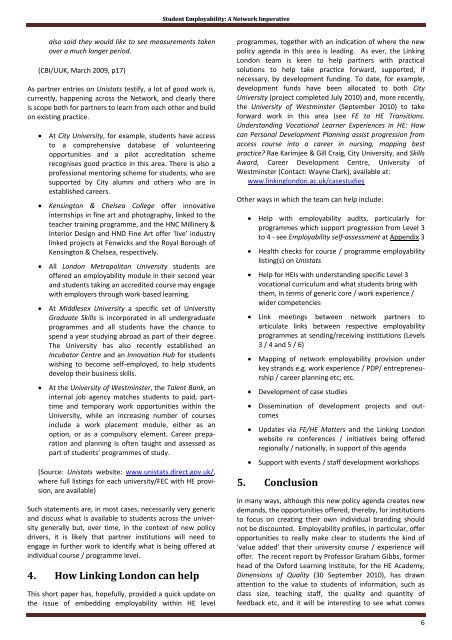Student Employability: A Network Imperative - Birkbeck, University of ...
Student Employability: A Network Imperative - Birkbeck, University of ...
Student Employability: A Network Imperative - Birkbeck, University of ...
Create successful ePaper yourself
Turn your PDF publications into a flip-book with our unique Google optimized e-Paper software.
<strong>Student</strong> <strong>Employability</strong>: A <strong>Network</strong> <strong>Imperative</strong><br />
also said they would like to see measurements taken<br />
over a much longer period.<br />
(CBI/UUK, March 2009, p17)<br />
As partner entries on Unistats testify, a lot <strong>of</strong> good work is,<br />
currently, happening across the <strong>Network</strong>, and clearly there<br />
is scope both for partners to learn from each other and build<br />
on existing practice.<br />
• At City <strong>University</strong>, for example, students have access<br />
to a comprehensive database <strong>of</strong> volunteering<br />
opportunities and a pilot accreditation scheme<br />
recognises good practice in this area. There is also a<br />
pr<strong>of</strong>essional mentoring scheme for students, who are<br />
supported by City alumni and others who are in<br />
established careers.<br />
• Kensington & Chelsea College <strong>of</strong>fer innovative<br />
internships in fine art and photography, linked to the<br />
teacher training programme, and the HNC Millinery &<br />
Interior Design and HND Fine Art <strong>of</strong>fer ‘live’ industry<br />
linked projects at Fenwicks and the Royal Borough <strong>of</strong><br />
Kensington & Chelsea, respectively.<br />
• All London Metropolitan <strong>University</strong> students are<br />
<strong>of</strong>fered an employability module in their second year<br />
and students taking an accredited course may engage<br />
with employers through work‐based learning.<br />
• At Middlesex <strong>University</strong> a specific set <strong>of</strong> <strong>University</strong><br />
Graduate Skills is incorporated in all undergraduate<br />
programmes and all students have the chance to<br />
spend a year studying abroad as part <strong>of</strong> their degree.<br />
The <strong>University</strong> has also recently established an<br />
Incubator Centre and an Innovation Hub for students<br />
wishing to become self‐employed, to help students<br />
develop their business skills.<br />
• At the <strong>University</strong> <strong>of</strong> Westminster, the Talent Bank, an<br />
internal job agency matches students to paid, parttime<br />
and temporary work opportunities within the<br />
<strong>University</strong>, while an increasing number <strong>of</strong> courses<br />
include a work placement module, either as an<br />
option, or as a compulsory element. Career preparation<br />
and planning is <strong>of</strong>ten taught and assessed as<br />
part <strong>of</strong> students’ programmes <strong>of</strong> study.<br />
(Source: Unistats website: www.unistats.direct.gov.uk/,<br />
where full listings for each university/FEC with HE provision,<br />
are available)<br />
Such statements are, in most cases, necessarily very generic<br />
and discuss what is available to students across the university<br />
generally but, over time, in the context <strong>of</strong> new policy<br />
drivers, it is likely that partner institutions will need to<br />
engage in further work to identify what is being <strong>of</strong>fered at<br />
individual course / programme level.<br />
4. How Linking London can help<br />
This short paper has, hopefully, provided a quick update on<br />
the issue <strong>of</strong> embedding employability within HE level<br />
programmes, together with an indication <strong>of</strong> where the new<br />
policy agenda in this area is leading. As ever, the Linking<br />
London team is keen to help partners with practical<br />
solutions to help take practice forward, supported, if<br />
necessary, by development funding. To date, for example,<br />
development funds have been allocated to both City<br />
<strong>University</strong> (project completed July 2010) and, more recently,<br />
the <strong>University</strong> <strong>of</strong> Westminster (September 2010) to take<br />
forward work in this area (see FE to HE Transitions.<br />
Understanding Vocational Learner Experiences in HE: How<br />
can Personal Development Planning assist progression from<br />
access course into a career in nursing, mapping best<br />
practice? Rae Karimjee & Gill Craig, City <strong>University</strong>, and Skills<br />
Award, Career Development Centre, <strong>University</strong> <strong>of</strong><br />
Westminster (Contact: Wayne Clark), available at:<br />
www.linkinglondon.ac.uk/casestudies<br />
Other ways in which the team can help include:<br />
• Help with employability audits, particularly for<br />
programmes which support progression from Level 3<br />
to 4 ‐ see <strong>Employability</strong> self‐assessment at Appendix 3<br />
• Health checks for course / programme employability<br />
listing(s) on Unistats<br />
• Help for HEIs with understanding specific Level 3<br />
vocational curriculum and what students bring with<br />
them, in terms <strong>of</strong> generic core / work experience /<br />
wider competencies<br />
• Link meetings between network partners to<br />
articulate links between respective employability<br />
programmes at sending/receiving institutions (Levels<br />
3 / 4 and 5 / 6)<br />
• Mapping <strong>of</strong> network employability provision under<br />
key strands e.g. work experience / PDP/ entrepreneurship<br />
/ career planning etc; etc.<br />
• Development <strong>of</strong> case studies<br />
• Dissemination <strong>of</strong> development projects and outcomes<br />
• Updates via FE/HE Matters and the Linking London<br />
website re conferences / initiatives being <strong>of</strong>fered<br />
regionally / nationally, in support <strong>of</strong> this agenda<br />
• Support with events / staff development workshops<br />
5. Conclusion<br />
In many ways, although this new policy agenda creates new<br />
demands, the opportunities <strong>of</strong>fered, thereby, for institutions<br />
to focus on creating their own individual branding should<br />
not be discounted. <strong>Employability</strong> pr<strong>of</strong>iles, in particular, <strong>of</strong>fer<br />
opportunities to really make clear to students the kind <strong>of</strong><br />
‘value added’ that their university course / experience will<br />
<strong>of</strong>fer. The recent report by Pr<strong>of</strong>essor Graham Gibbs, former<br />
head <strong>of</strong> the Oxford Learning Institute, for the HE Academy,<br />
Dimensions <strong>of</strong> Quality (30 September 2010), has drawn<br />
attention to the value to students <strong>of</strong> information, such as<br />
class size, teaching staff, the quality and quantity <strong>of</strong><br />
feedback etc, and it will be interesting to see what comes<br />
6

















